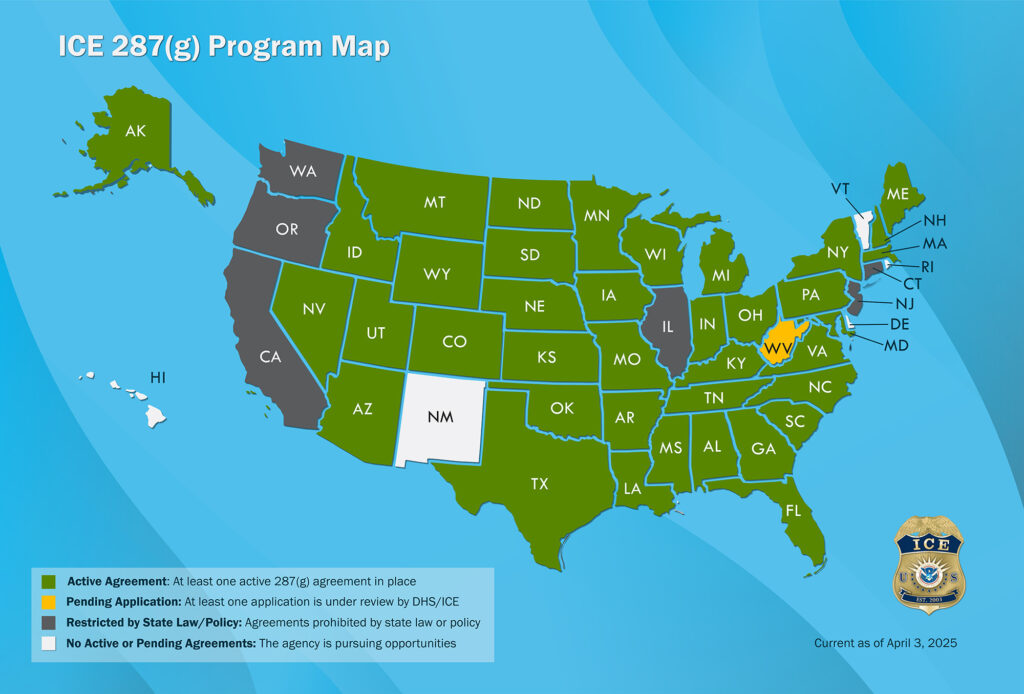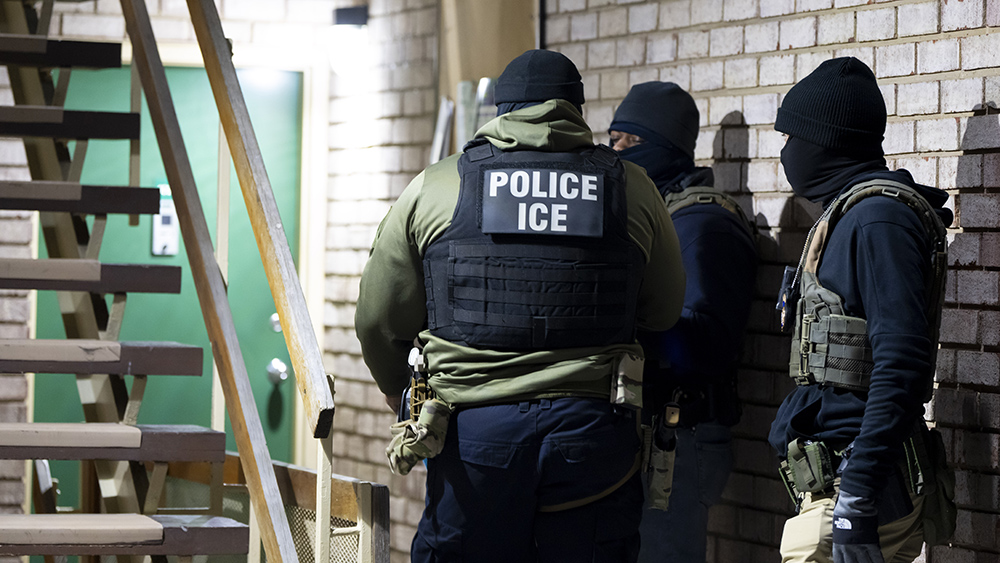The University of North Florida is working with the U.S. Immigration and Customs Enforcement agency on an agreement that would allow its police department to carry out immigration enforcement on campus, as are law enforcement at the rest of the state’s 12 public universities.
The move comes after all of the state’s sheriff’s offices signed up for similar training, and some police departments in Northeast Florida also are considering ICE training that would allow them to detain, question and jail “any alien or person believed to be an alien,” under the ICE agreement.
The 14-page university memo is basically the same agreement sent to all 67 Sheriff’s Offices in Florida. It spells out the terms and conditions of how university police officers will be trained to perform nine functions of an immigration officer under ICE’s supervision.
That includes “the power and authority to interrogate any alien or person believed to be an alien as to his right to be or remain in the United States, and to process for immigration violations those individuals who have been arrested for State or Federal criminal offenses,” the memo says.
It also gives trained campus police the authority “to arrest without a warrant any alien entering or attempting to unlawfully enter the United States in the officer’s presence or view.”
The agreement await’s ICE approval, UNF spokesperson Amanda Ennis said.
“The (agreement) has not been signed” by ICE,” she said in an email. “The UNF Police Department has not conducted any training, and there are currently no plans for training in the future.”
But having such an agreement between ICE and UNF could mean the safety and security of college students on campus will be at risk, said state Rep. Angie Nixon, D-Jacksonville. In a statement Wednesday, she called on UNF to stand up for students and not train campus police to work on ICE’s behalf.
“Under the Trump regime’s hostile government takeover, no one is safe from political abduction and disappearing without a trial, making this ICE agreement dangerous for UNF students,” Nixon wrote. “Trump has betrayed children with cancer, college professors, parents, and students in service to his greedy, billionaire puppet masters, but we deserve better. All of our University of North Florida students belong here so they can learn, grow, and contribute to our communities, regardless of where they are from.”
ICE and local governments
The university agreements are part of a series of actions taken by state and county organizations in the wake of sweeping changes in the way the U.S. government handles immigration.
Those changes include the addition of the 287(g) Program to the Illegal Immigration Reform and Immigrant Responsibility Act of 1996. That program allows ICE to delegate authority to perform specified immigration officer functions to state, city or county law enforcement agencies under its direction and oversight.
ICE has a website showing which states have at least one active 287(g) agreement in place, including Florida and Georgia, or those with pending applications.

Florida Gov. Ron DeSantis directed state law enforcement agencies Feb. 19 to work with ICE to execute functions of immigration enforcement within the state.
The governor also signed a number of immigration enforcement bills, an almost $300 million package that supports President Donald Trump’s mass deportation agenda, according to the Associated Press.
Florida’s bills include requirements that local and state agencies support federal immigration enforcement and includes the hiring more than 50 new law enforcement officers focused on it. The bills also include grants to equip and train local agencies and reimbursement for leasing detention facilities.
“By allowing our state agents and law enforcement officers to be trained and approved by ICE, Florida will now have more enforcement personnel deputized to assist federal partners,” DeSantis said. “That means deportations can be carried out more efficiently.”
The Florida Highway Patrol has already executed its agreement with ICE, as has the Florida Department of Agricultural Law Enforcement.
Enforcement in Jacksonville
Jacksonville enacted a law that allows immigrants in the city without legal status to be jailed up to 60 days. Mayor Donna Deegan objected to the law but allowed it to take effect without her signature because she saw no “clear path to a (sustainable) veto.”
The bill also directs $76,250 in unused Economic Development Grant money for the Sheriff’s Office to add more fingerprint scanners to the 150 already deployed. Officers would use them to check the immigration status of someone suspected of committing a crime.
The university memorandums say the Immigration and Nationality Act authorizes Homeland Security to enter into written agreements with any official state organization so that qualified officers “can perform certain functions of an immigration officer.”
As part of that agreement, any university police officer authorized to perform immigration officer duties must complete mandatory training provided by ICE.
Once trained and authorized, a campus officer can perform specific duties such as interrogating anyone as to their right to be in the U.S. They can arrest someone without a warrant for felonies committed under any federal law regulating admission or exclusion of immigrants, if they believe that person “is in violation of law and is likely to escape before a warrant can be obtained.”
Around the First Coast
Jacksonville Today reached out to local sheriff’s offices and police departments to determine which are taking part in ICE’s immigration program. A few responded.
Nassau County: The Nassau County’s Sheriff’s Office has signed the agreement, spokesperson Alicia Tarancon said. “We are in the process of waiting on ICE to provide training for a few deputies in Nassau County,” Tarancon said.
Fernandina Beach: The Fernandina Beach Police Department is “not in the process of certifying our officers” and will cede local immigration enforcement to the Nassau County Sheriff’s Office, said Police Chief Jeffrey Tambasco.
St. Johns County: The St. Johns County Sheriff’s Office is “working with the Florida Sheriffs Association on this,” according to a spokesperson.
St. Augustine: A St. Augustine Police Department spokesperson said law enforcement agencies in the county “are all working together” on it.
Green Cove Springs: Green Cove Springs signed the agreement with ICE on March 18 and “will assign designated officers to participate” once more details and training are provided by ICE, city spokesperson Heather Fincher said.
Orange Park: The Orange Park Town Council is considering an ordinance that would authorize an agreement so its police force could help ICE. No decision was made during a town council meeting Tuesday night. Police Chief Randy Case said the department is not going to be involved in “door-to-door” searches for illegal immigrants, according to News4Jax, a Jacksonville Today news partner.
“That’s my directive,” he said. “I can say we are not doing that.”
Some residents spoke up at the meeting, saying they opposed their town police department taking part in ICE operations.
“Let’s be real: They’ve have got enough problems to deal with,” Will Williams told the council. “We ask them to be social workers on the street, dealing with our unhoused community members. We ask them to deal with any substance abuse issues people are having on our streets, or poverty crimes we see out there. There’s a lot we have already asked our police to do.”







